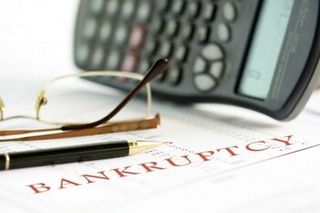BANKRUPTCY
Bankruptcy Law
Bankruptcy
is a legal method of eliminating debt and providing a means for debt-oppressed people to obtain a "fresh start." In many cases, bankruptcy means the elimination of the debt that you owe to your creditors. There are two primary forms of bankruptcy, Chapter 7 and Chapter 13.
There are several situations where a chapter 13 is preferable to a chapter 7.
There are several situations where a chapter 13 is preferable to a chapter 7.
A Chapter 13 is commonly referred to as "straight bankruptcy" and it is the most commonly filed form. Only individuals (not businesses or partnerships) may obtain a discharge in a Chapter 7 proceeding. Large credit card debt and other unsecured bills coupled with few assets, typify the filer of this form of bankruptcy. In the vast majority of cases this type of bankruptcy is able to completely eliminate all of the filers debts . A chapter 13 bankruptcy is normally for people who have too much income to file a Chapter 7 bankruptcy or have the kind of debt that is non dis-chargeable in a Chapter 7. Also, people file Chapter 13 because they are behind on their mortgage or business payments and are trying to avoid foreclosure.

A chapter 13 bankruptcy allows them to make up their overdue payments over time and to reinstate the original agreement. However, for the vast majority of individuals who simply want to eliminate their heavy debt burden without paying any of it back, Chapter 7 provides the most attractive choice.
It seems the stigma attached to filing bankruptcy has greatly diminished over the last decade as a fast increasing percentage of the population file every year. Bankruptcy filing are
not normally published in newspapers, therefore the only people who usually find out that you are in a bankruptcy are your creditors.
If you are facing foreclosure, repossession, wage garnishment or you are in debt way over your head, bankruptcy will provide you the “fresh start” needed to protect your assets and your future.
If you are facing foreclosure, repossession, wage garnishment or you are in debt way over your head, bankruptcy will provide you the “fresh start” needed to protect your assets and your future.
BROWSE OUR WEBSITE
CONTACT INFORMATION
124 East Amite St, Jackson, MS 39201
twade42@aol.com (601) 948-7770
twade42@aol.com (601) 948-7770
| Sun | Closed |
| Mon-Fri | 8:00 AM - 5:30 PM |
| Sat | Closed |


OUR LOCATION
CONTACT INFORMATION
124 East Amite St, Jackson, MS 39201
twade@tatumandwade.com
(601) 9487770
twade@tatumandwade.com
(601) 9487770
| Sun | Closed |
| Mon-Fri | 8:00 AM - 5:30 PM |
| Sat | Closed |


